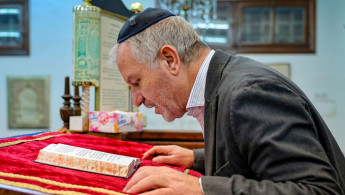'No to brownwashing': Moroccan post-Passover Mimouna festival with Israeli officials triggers outcry
Several Moroccans have condemned what they call the "instrumentalisation" of the Moroccan post-Passover festival to "brownwash" normalisation with Israel after a Jewish museum in Essaouira hosted Mimouna's celebrations that included Israeli officials.
Over the weekend, an estimated 15,000 Israeli tourists flocked to Rabat from Tel Aviv to celebrate the Mimouna festival, a post-Passover ceremony that was uniquely created by the Moroccan Jewish community back in the 18th century.
"Trebhou w Tseedo" (to win and to be happy) is how Moroccan Muslims traditionally congratulate Moroccan Jews after the end of the Passover feast.
The most common story about the creation of Mimouna says that the Moroccan Jews welcomed their Muslim neighbours to their homes to herald the beginning of Spring and thank them for keeping their chametz (leaven) during the Passover holiday.
Muslim neighbours, in turn, bring flour, which is forbidden in Jewish homes over Passover, and the Jewish hosts in turn prepare the treats. Moroccan music and traditional clothes often complement the harmony of the celebration.
On Saturday, the Jewish museum Bayt Dakira in Essaouira hosted Mimouna's celebrations, including an Islamic iftar that featured several dishes related to the Jewish festival.
The festival, which coincides this year with the Islamic holy month of Ramadan, was deemed a sign of coexistence and tolerance that inhabited, for centuries, the Moroccan kingdom.
However, the heavy presence of Israeli officials during the event has triggered an outcry.
لبارح فالصويرة تم تنظيم إفطار جماعي في الزاوية القادرية بمناسبة ميمونة واللي حضرو فيه مسلمين ومسيحيين ويهود، واللي كان إفطار يعكس التعايش والتسامح اللي كتمتاز بيه المغرب بشكل عام والصويرة بشكل خاص ...
— charafeddine ben m'hair (@charafeddinebe7) April 24, 2022
...#الصويرة #المغرب pic.twitter.com/V1x58XFHdv
Under the hashtag "Morocco and Israel brothers", some Moroccan users welcomed Israeli officials to "their second country", expressing a full endorsement of the newborn-public normalisation between the two countries.
Meanwhile, other Moroccans did not hide their frustration over hosting officials from Tel Aviv in Morocco, particularly as Israel continues its offensive against Palestinians at the Al-Aqsa compound.
"Of course, Jewish people are part of our community and history, but Judaism and Zionism are two different things. We can coexist with Jews without normalising an apartheid country that attacks our Muslim and Christian brothers and sisters every day," Oussama, a Moroccan student, told The New Arab.
تقاليد وعادات المغرب ظلت متجدرة ومحفورة في قلوب اليهود المغاربة الذين نقلوها بدورهم عبر الاجيال...وعيد #ميمونة من بين الأعياد التي تمسكو بها إلى أن أصبحت عيدا وطنيا في دولة #إسرائيل #المغرب_إسرائيل_خاوة_خاوة 🇮🇱🇲🇦#تسعدو_وتربحو pic.twitter.com/1yAg0J768K
— Hanan.H (@navela888) April 23, 2022
Jewish Voice for Peace, an anti-Zionist Jewish NGO, also warned against using the celebration as a means to distract from Israeli colonialism and occupation.
"Our Mimouna celebrations won't be used to marginalise or tokenise our people, "brownwash" Israeli colonialism and occupation, or erase our history of the community with Muslims in our ancestors' homelands," the NGO said in an Instagram post on Friday.
Since inaugurating the formal Moroccan-Israeli ties in late 2020, Rabat had actively relied on the Jewish-Moroccan cultural asset.




 Follow the Middle East's top stories in English at The New Arab on Google News
Follow the Middle East's top stories in English at The New Arab on Google News
![A group of Palestinians, foreign and Israeli activists gather to participated in an olive picking event on the land in the town of Battir, which is under threat of confiscation by Israel in Bethlehem, occupied West Bank on 8 November 2024. [Getty]](/sites/default/files/styles/image_330x185/public/2182930803.jpeg?h=199d8c1f&itok=__0LgGsa)

![People gathered around the rubble of destroyed houses to search for survivors [Getty]](/sites/default/files/styles/image_330x185/public/2024-11/GettyImages-2184733820.jpg?h=199d8c1f&itok=NiM1LO2f)